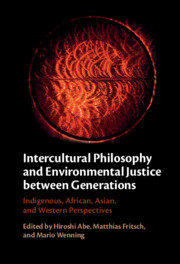 Intercultural Philosophy and Environmental Justice between Generations
Intercultural Philosophy and Environmental Justice between Generations Book contents
- Intercultural Philosophy and Environmental Justice between Generations
- Intercultural Philosophy and Environmental Justice between Generations
- Copyright page
- Contents
- Contributors
- Acknowledgments
- Introduction
- Part I Indigenous Philosophies on Justice between Generations
- Part II Intergenerational Ethics in Dialogue with Confucianism and Daoism
- Part III Humanity Facing the Near Environmental Future
- 9 Double Intergenerational Responsibility
- 10 Guidelines for a Global Constitutional Convention for Future Generations
- 11 Philosophy for an Ending World
- Index
- References
9 - Double Intergenerational Responsibility
From a Western-Eastern View
from Part III - Humanity Facing the Near Environmental Future
Published online by Cambridge University Press: 14 March 2024
- Intercultural Philosophy and Environmental Justice between Generations
- Intercultural Philosophy and Environmental Justice between Generations
- Copyright page
- Contents
- Contributors
- Acknowledgments
- Introduction
- Part I Indigenous Philosophies on Justice between Generations
- Part II Intergenerational Ethics in Dialogue with Confucianism and Daoism
- Part III Humanity Facing the Near Environmental Future
- 9 Double Intergenerational Responsibility
- 10 Guidelines for a Global Constitutional Convention for Future Generations
- 11 Philosophy for an Ending World
- Index
- References
Summary
What is intergenerational responsibility? The present chapter aims at answering this question by demonstrating the following two points. First, future-oriented responsibility essentially requires past-oriented responsibility and vice versa (I call the former the ‘foreseeing-care-prevention’ type and the latter the ‘letting-the-dead-be’ type). Hence, second, intergenerational responsibility is composed of these two different and interdependent types of responsibility. I begin by clarifying what is meant by the foreseeing-care-prevention-type. Interpreting Derek Parfit and Hans Jonas, I try to characterize it in detail. Then I address the letting-the-dead-be type. In this context, I deal with Confucianism and the Japanese philosopher Tetsurô Watsuji. Lastly, I discuss how both of the types of responsibility are interconnected with each other, and conclude that our intergenerational responsibility means that we are responsible for future people and responsible to past generations at the same time.
- Type
- Chapter
- Information
- Intercultural Philosophy and Environmental Justice between GenerationsIndigenous, African, Asian, and Western Perspectives, pp. 167 - 177Publisher: Cambridge University PressPrint publication year: 2024
